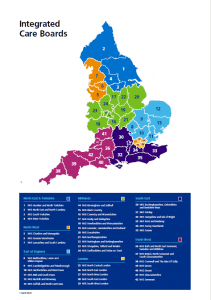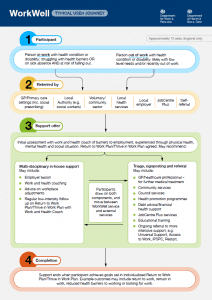Struan Hepburn
- Trainee Solicitor

Starting in October, WorkWell pilots across England will help employees with health conditions stay in or return to work. The £64 million initiative aims to support 59,000 people and ties into a broader reform of the fit note process, which intends to make it easier for employees to stay in work. Data published by the NHS in April 2024 indicated that around 94% of fit notes issued last year were signed “not fit for work.” Despite a change in government since WorkWell’s proposal, there’s still a desire to focus on what people can do with the right support, rather than taking them out of work entirely.
Although employers will want to support employees, they may be concerned about what obligations WorkWell may impose on them. Here’s what employers need to know:
WorkWell implements an integrated approach. Developed by the Department for Work and Pensions and the Department for Health and Social Care, it offers a simplified assessment process that connects people to local job support and health services like physiotherapy and counselling. The intention is to help manage health conditions or disabilities and identify needed workplace adjustments. By combining health and employment services, WorkWell aims to tackle both health and workplace challenges that contribute to long-term absences.
Another key feature of WorkWell is that each participant will be assigned a ‘Work and Health Coach’. This coach will work closely with the participant to assess their health and work-related challenges and develop a personalised plan (“Return to Work Plan/Thrive in Work Plan”). For employers, this means that if an employee is struggling with a health condition that impacts their ability to work, there is a single point of contact to coordinate necessary adjustments and support. This will hopefully reduce the administrative burden on employers.
The service is aimed at two groups:
The trial is taking place across 15 Integrated Care Board Areas (ICBs) across England:

During the trial period, each ICB has the latitude to decide what support they offer. For instance, Greater Manchester may focus heavily on physical health conditions, while Frimley could prioritise support for physical health conditions. The justification for a localised approach is that it ensures the support offered through WorkWell is responsive to the unique challenges faced by employees in different regions. Employers should therefore be aware that the expectations placed upon them, as well as the support offered to their employees, will depend on their postcode.
Employers can refer employees to WorkWell. While there is no specific guidance on how employers should refer employees, a collaborative approach is recommended.
Additionally, employers can benefit from guidance offered through WorkWell. Work and Health Coaches can advise how to make reasonable adjustments that facilitate an employee’s return to work. This could range from physical adjustments to an employee’s workstation to changes in job role or hours.
An example of a typical user journey is below:

Employers may receive requests for reasonable adjustments from an employee or job applicant that has obtained a Return to Work/Thrive in Work Plan without their support. There is no current obligation for employers to implement requests backed by a Work Plan, but this is something to monitor closely as the pilot evolves.
As the trial is in its infancy, employers should be aware that WorkWell may evolve and change over time. In the initial stages, there may be some teething problems and Pilot Areas may be influenced by the success or failures of other Pilot Areas. Employers should therefore pay close attention over the coming months.
As WorkWell focuses on connecting local services, employers that fail to engage meaningfully may be at risk of scrutiny within the communities they operate.
By engaging with the WorkWell pilot, employers can support the health and wellbeing of their workforce, enhance productivity, and reduce costs associated with long-term sickness absences and staff turnover.
With the WorkWell pilot set to influence future national policy, employers that engage with the pilot have the opportunity to play an active role in shaping a more supportive, health-integrated approach to employment.
With more employment law reforms and proposals on the way, now may be the right time for employers to review their policies and practices. For guidance and support, get in touch with Musab.Hemsi@andersonstrathern.co.uk
You may also be interested in the following articles: